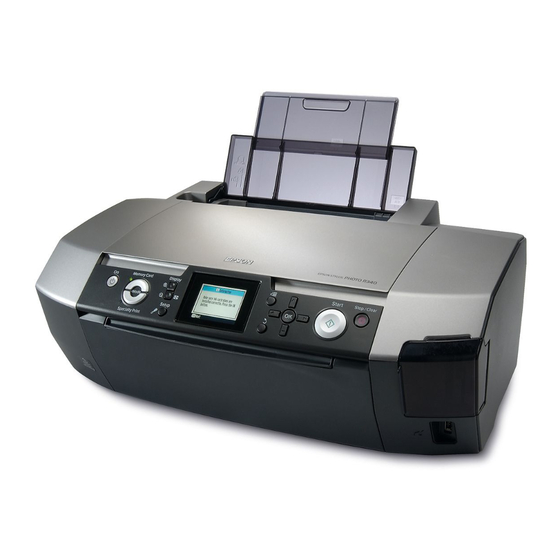Epson R340 - Stylus Photo Color Inkjet Printer Manuale operativo di base - Pagina 10
Sfoglia online o scarica il pdf Manuale operativo di base per Accessori per stampanti Epson R340 - Stylus Photo Color Inkjet Printer. Epson R340 - Stylus Photo Color Inkjet Printer 40. C11c607011
Anche per Epson R340 - Stylus Photo Color Inkjet Printer: Specifiche tecniche (2 pagine), Manuale (13 pagine), Iniziare qui Manuale (9 pagine), Riferimento rapido (4 pagine), Manuale d'istruzione (4 pagine)

3.
Turn on the printer and your storage device.
After a moment, the printer reads and counts the
number of images on your card. When it's done,
your images are available for printing (see
page 11).
Saving your photos to an external
device
If you don't have a computer, you can save photos that
are on your camera's memory card to an external
device that you connect directly to your printer. This
lets you delete the images on your memory card and
reuse it without losing your original photos. Follow
the steps below to save your photos to a Zip disk,
CD-R, DVD-R, or thumb drive:
Note:
Epson cannot guarantee the compatibility of any cameras or drives.
If you're not sure about your camera or drive, you can try connecting
it. If it's not compatible, you'll see a screen saying that the connected
device cannot be used.
1.
Make sure the printer is turned on and the
memory card you want to back up is inserted in
the printer.
2.
If you are using a CD-R/RW drive or Zip drive,
plug it into an electrical outlet if required.
3.
Connect a USB cable from your drive to the EXT
I/F USB port on the front of the printer (see page 9).
4.
Press the q Setup button on the printer.
5.
Press the u or d button to highlight Backup, then
press the r button.
6.
Press the OK button. When you see the "Starting
backup" message, press the OK button again to
start the backup procedure. You may have to
follow additional instructions on the printer
screen. All the photos on your card are copied to
your external storage drive. Depending on how
many photos there are, this may take several
minutes.
Note:
❏ Do not perform backup while printing from the computer to the
printer.
❏ Do not connect the external storage drive while the computer is
accessing the memory card in the printer.
❏ The format for writing to CD-R is Multisession (Mode 1) and the
file system is ISO 9660. Due to the ISO 9660 file system, the
contents of a memory card that has 8 or more folder levels cannot
be backed up to CD-R.
❏ The characters that can be used for folder and file names on the
CD-R are capitals and the underscore (_). Other characters are
changed to underscores when backing up to CD-R.
10
Accessing Images to Print
Printing Directly from a
Digital Camera
PictBridge and USB DIRECT-PRINT lets you print
your photos by connecting your digital camera
directly to the printer.
Connecting and Printing
1.
Make sure your printer is not printing from a
computer.
2.
Make sure that no memory card is loaded.
3.
Turn the printer and load the type of paper you
want to use. (see page 7)
4.
Use the printer's control panel to adjust the print
setting. (e.g. Paper Type, Paper Size, and Layout)
5.
Turn the digital camera, then connect the printer
and the digital camera with a USB cable.
6.
Use the digital camera to select the photo you want
to print. Be sure to make the desired setting on the
digital camera because the digital camera settings
generally take precedence over the printer
settings.
7.
Print from the digital camera.
Note:
❏ Do not backup before or while a digital camera is connected to
the printer.
❏ Some of the setting on your digital camera may not be reflected
in the output because of the printer's specifications.
❏ Depending on the type of digital camera, images containing
DPOF information may not be available for CD/DVD printing.
